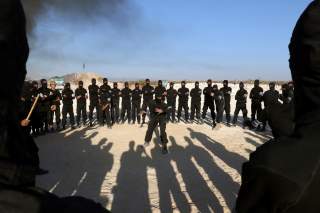Defeating the Islamic State of Idlib
The Trump administration has made clear that it wants to avoid getting involved in the Idlib’s crisis and appears reluctant to deal with the Salafi-jihadi threat there—and that puts Americans in danger.
In hindsight, Turkey apparently maintained its belief that it could eliminate HTS by mobilizing and supporting its allied rebel groups in Idlib to dislodge HTS. To Ankara’s surprise and chagrin, HTS was able to turn the table on Turkey by maintaining its presence in the DMZ, executing its rival leaders and groups, and bringing virtually all jihadi organizations under its command. By January 2019, HTS had gained control over Idlib and the surrounding areas. In short, HTS has created an Islamic state in Idlib in all but in name. In fact, HTS rules Idlib through the creation of a Syrian Salvation Government whose ministers are technocrats and HTS members or affiliates. The Syrian Salvation Government has operated Idlib as an independent state by providing various ministerial services ranging from delivering electricity and water for a fee.
Witnessing the collapse of the Sochi agreement, Russia apparently gave the go-ahead to the Syrian regime to begin its onslaught on Idlib. As of the time of this writing, hundreds of innocent civilians have been killed from Syrian and Russian bombs. The UN has repeatedly cautioned against an impending catastrophe in Idlib. In this respect, the Trump administration is correct in voicing its concerns about the unfolding tragedy in Idlib. However, the administration has done little, if anything, to encounter the growing power of Salafi-jihadists in Idlib, led by Al Qaeda affiliates. Correspondingly, the administration has to reverse its passive approach to Idlib, as reflected in Trump’s tweet and the administration’s narrow focus on defeating the Islamic State. Thousands of Islamic State fighters are roaming both Iraq and Syria and most likely will join the decisive battle of Idlib. No doubt, the administration has no easy solutions for defeating the jihadis, checking the power of Russia, Syria and Turkey in Idlib, and saving the civilians; nevertheless, the administration has to be fully involved in finding a compromise that would not only prevent a Syrian tragedy today but also an American tragedy tomorrow. Such a compromise must includeTurkey and Russia
Idlib is virtually an Islamic state ruled by the most hardcore of Salafi-jihadis. Unfortunately, the Trump administration has made clear that it wants to avoid getting involved in the Idlib’s crisis and appears reluctant to deal with the Salafi-jihadi threat there. Thus, the Trump administration is pursuing a policy at its own peril—one that could endanger Americans.
Robert G. Rabil is professor of political science at Florida Atlantic University. He is the author of Embattled Neighbors: Syria, Israel and Lebanon (2003); Syria, United States and the War on Terror in the Middle East (2006); Religion, National Identity and Confessional Politics in Lebanon: The Challenge of Islamism (2011); Salafism in Lebanon: From Apoliticism to Transnational Jihadism (2014); The Syrian Refugee Crisis in Lebanon: The Double Tragedy of Refugees and Impacted Host Communities (2016); and most recently White Heart (2018). The views expressed in this article do not necessarily reflect those of FAU. He can be reached @robertgrabil.
Image: Reuters

